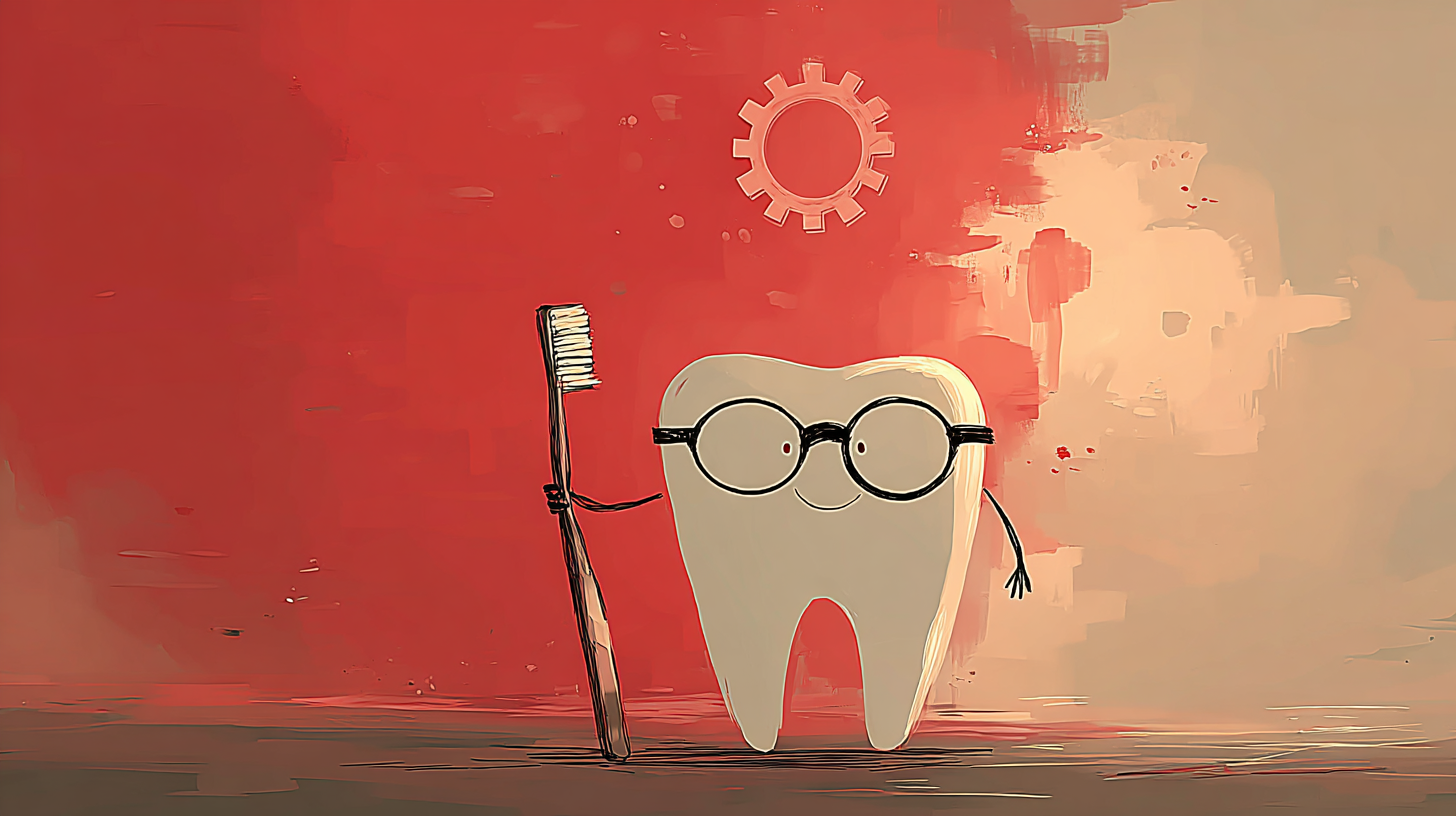A tooth is a hard white part in your mouth for biting and chewing food. It can also mean a small pointed part of a tool.
「tooth」は、口の中で食べ物をかむ白くて硬い部分。道具の突起部分もこう呼ぶことがある。
以下は英単語 “tooth” に関するストーリー型学習コンテンツです。まずは大枠の意味を理解して最後の文章で確認しましょう。
主な意味(main meaning)
| 品詞 | 発音記号 | 意味 | 英語例文 |
|---|---|---|---|
| 名詞 | /tuːθ/ | 歯(人や動物の口の中にある、食べ物をかむための硬い部分) | I have a tooth that hurts when I eat sweets. |
| 名詞 | /tuːθ/ | 歯のような形のもの(ギアや道具の突起部分など) | The gear has a broken tooth, so it doesn’t work well. |
語源(etymology)
古英語 tōth から来ており、さらに古くはゲルマン祖語 tanþs にさかのぼる。「かむための硬い突起」というイメージが核。
類義語(synonyms)
| 類義語 | 英語例文 |
|---|---|
| molar | The dentist said my molar needs to be cleaned more often. |
| fang | The snake’s fang is very sharp. |
| incisor | The rabbit has long incisors for cutting vegetables. |
| tusk | An elephant uses its tusk to dig and defend itself. |
反義語(antonyms)
| 反義語 | 英語例文 |
|---|---|
| gum | The dentist checked my gum for any signs of disease. |
| denture | My grandfather wears a denture because he lost his real teeth. |
コロケーション(collocations)
| コロケーション | 英語例文 |
|---|---|
| brush your teeth | Remember to brush your teeth twice a day. |
| lose a tooth | Children usually lose a tooth when they are about six years old. |
| tooth decay | Eating too much sugar can cause tooth decay. |
| wisdom tooth | I had my wisdom tooth removed last year. |
2項表現(binomials)
| 2項表現 | 英語例文 |
|---|---|
| teeth and gums | Healthy teeth and gums are important for good health. |
| tooth and nail | She fought tooth and nail to protect her rights. |
英語ストーリー(english story)
The Tooth Trouble at Work
Last Monday morning, I woke up with a terrible pain in my mouth. I touched my cheek and realized it was my back tooth. The pain was so sharp that I could hardly eat breakfast. I brushed my teeth carefully, but it didn’t help much.
When I arrived at my office, my colleague Sarah noticed I looked pale. “Are you okay?” she asked. I told her about my toothache. She said, “It might be your wisdom tooth. I had mine removed last year, and it felt just like that.”
I still had to finish a report for my boss, so I fought tooth and nail to concentrate. But by lunchtime, the pain became worse. My friend Tom suggested I see a dentist immediately. At the dental clinic, the dentist checked my teeth and gums. He explained, “You have tooth decay on your molar. We need to treat it right away.”
During the treatment, I saw the dentist’s tools, each with tiny metal parts that looked like the teeth of a gear. It reminded me that “tooth” doesn’t only mean the one in your mouth.
When I got home, I thought about how important it is to brush your teeth every day and avoid too much sugar. I also realized that sometimes, taking care of one tooth can save you from a lot of trouble.
和訳
職場での歯のトラブル
先週の月曜の朝、口の中にひどい痛みを感じて目が覚めた。頬に触れると、奥歯(tooth)が原因だった。痛みはとても鋭くて、朝ごはんもほとんど食べられなかった。歯を丁寧に磨いた(brush your teeth)が、あまり効果はなかった。
会社に着くと、同僚のサラが私の顔色が悪いのに気づいた。「大丈夫?」と聞かれ、私は歯の痛みについて話した。彼女は「それは親知らず(wisdom tooth)かも。私は去年抜いたけど、同じような感じだったわ」と言った。
上司への報告書を仕上げなければならなかったので、必死に(tooth and nail)集中しようとした。しかし昼頃には、痛みはさらに悪化した。友人のトムが「すぐに歯医者に行った方がいい」と勧めてくれた。
歯科医院で、歯科医は私の歯と歯茎(teeth and gums)を調べ、「奥歯(molar)が虫歯(tooth decay)になっています。すぐに治療が必要です」と説明した。
治療中、歯科医の道具を見たら、小さな金属の突起がまるで歯車の歯(tooth)のように見えた。「tooth」という言葉は口の中の歯だけじゃないんだと改めて思った。
家に帰ってから、毎日歯を磨くことと、砂糖を摂りすぎないことがどれほど大切かを考えた。たった一本の歯を守ることが、大きなトラブルを防ぐことにつながるのだ。
Q&A
Q: 「tooth」と「molar」の違いは?
A: 「tooth」は歯全般を指します。「molar(奥歯)」はその中でも食べ物をすりつぶすための奥の歯を指します。
Q: 「tooth」と「fang」の違いは?
A: 「tooth」は人や動物の歯全般を意味します。「fang(牙)」は肉食動物や蛇の鋭く長い歯を指します。攻撃や捕食に使う特別な歯です。
Q: 「tooth」と「incisor」の違いは?
A: 「tooth」はすべての歯を含む一般的な言葉です。「incisor(切歯)」は前歯のことを指し、食べ物をかみ切るための歯です。
Q: 「tooth」と「tusk」の違いは?
A: 「tooth」は口の中の普通の歯を指します。「tusk(牙)」はゾウやセイウチなどが持つ口の外に長く伸びた大きな歯で、戦いや道具としても使われます。
Q: 「tooth」と「gum」の違いは?
A: 「tooth」は硬い歯の部分です。「gum(歯茎)」は歯を支えている柔らかい部分を指します。
Q: 「tooth」と「denture」の違いは?
A: 「tooth」は自然の歯です。「denture(入れ歯)」は失った歯を補うための人工の歯です。
Q: 「brush your teeth」と「tooth」の違いは?
A: 「tooth」は名詞で歯そのものを意味します。「brush your teeth(歯を磨く)」は動作を表すフレーズです。
Q: 「lose a tooth」と「tooth」の違いは?
A: 「tooth」は歯を指します。「lose a tooth(歯が抜ける)」はその歯を失う動作や状態を表します。
Q: 「tooth decay」と「tooth」の違いは?
A: 「tooth」は歯そのものです。「tooth decay(虫歯)」は歯が傷んでしまった状態を指します。
Q: 「wisdom tooth」と「tooth」の違いは?
A: 「tooth」はすべての歯を含む言葉です。「wisdom tooth(親知らず)」は特に10代後半から20代に生えてくる奥歯を指します。



コメント